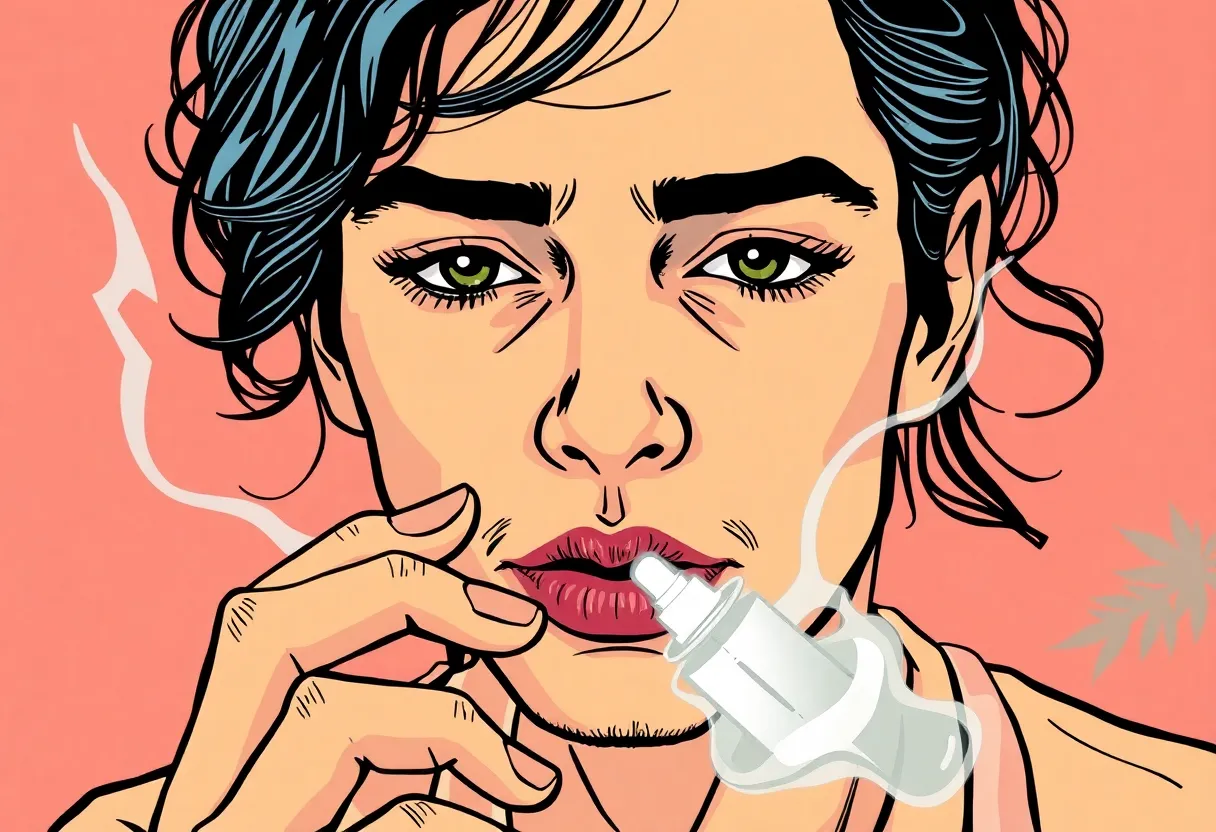Table of Contents
Does Smoking Weed Cause Acne? In recent years, the prevalence of marijuana use has increased significantly, raising questions about its various health impacts. As cannabis becomes more mainstream, curiosity about its effects on skin health, particularly acne, has surged. Understanding the potential connection between smoking weed and acne involves examining hormonal fluctuations, lifestyle factors, and scientific research. This exploration delves into how cannabis might influence acne development and possibly exacerbate the condition. For those seeking clearer skin, it becomes critical to understand these dynamics and consider alternative solutions for managing acne effectively. Discover the nuances of this relationship and its broader implications on skin health.
Key Takeaways
- Smoking weed may contribute to acne development by influencing hormone levels, particularly those related to oil production in the skin.
- The lifestyle changes associated with cannabis use, such as shifts in diet and stress levels, can potentially impact acne severity.
- Current scientific evidence regarding the direct link between marijuana use and acne is limited but indicates possible connections.
- Alternative acne management strategies, including dietary adjustments and improved skincare routines, may benefit individuals who use cannabis.
Understanding Acne and Its Causes

Acne is a ubiquitous dermatological condition that affects an estimated 50 million Americans annually. Its onset is primarily linked to hormonal fluctuations, which lead to an increase in oil production, creating an environment conducive to acne development. Androgens, a type of hormone that becomes more active during puberty, can enlarge oil glands, leading to clogged pores and acne lesions.
Genetics also play a significant role in acne predisposition. Individuals with a family history of acne may have a higher likelihood of developing the condition, as genetic factors can influence oil gland size and skin cell turnover.
Lifestyle factors are critical in acne management as well. High-glycemic diets, which include refined carbohydrates and sugars, have been associated with increased sebum production and acne. Additionally, stress, an often-overlooked contributor, can exacerbate acne by triggering hormone release that promotes oil production.
Poor hygiene and the use of comedogenic, or pore-clogging, skin care products can further aggravate acne. Regular cleansing and the use of non-comedogenic products are recommended to prevent outbreaks.
Understanding these core causes can aide in mitigating acne development. While hormonal levels and genetics are largely beyond one’s control, lifestyle adjustments, such as maintaining a balanced diet, practicing stress-reduction techniques, and adhering to a proper skincare routine, can significantly reduce acne occurrences, thus contributing to clearer, healthier skin.
Impact of Weed on Hormones
Marijuana use has been shown to influence various hormonal functions, which may play a role in acne development. When marijuana is consumed, it interacts with the body’s endocannabinoid system, which is involved in regulating many bodily processes, including hormone production and secretion.
Hormonal Fluctuations
One of the primary concerns is the impact of marijuana on testosterone levels, a hormone closely linked to sebum production. Sebum is the oily substance that can clog pores, leading to acne. Some studies suggest that marijuana may cause an increase in testosterone, potentially exacerbating acne in individuals predisposed to it. Conversely, other findings suggest a potential decrease in testosterone levels, indicating the complexity of marijuana’s impact on hormonal balance.
Cortisol Effects
The use of marijuana may also influence levels of cortisol, commonly known as the stress hormone. Elevated cortisol levels have been associated with increased acne severity, as stress can exacerbate skin conditions. Marijuana’s ability to either elevate or reduce cortisol levels depends on the frequency of use and the individual’s physiological response.
Insulin Resistance
There is evidence to suggest that marijuana might affect insulin levels, contributing to insulin resistance. Insulin resistance can lead to increased insulin-like growth factor (IGF-1), another hormone linked to heightened sebum production and acne. This condition underscores the multifaceted relationship between marijuana usage and hormonal activity, which could contribute to acne in susceptible individuals.
Overall, while marijuana’s influence on the endocrine system is evident, the variable nature of its effects highlights the need for individual evaluation when considering its implications for acne and hormonal health.
Lifestyle Changes Related to Weed Use

Marijuana use often brings about various lifestyle changes that may influence acne development. One notable change is in dietary habits. Users might experience an increase in appetite, often referred to as “the munchies,” which can lead to increased consumption of sugary or greasy foods. These dietary changes can contribute to acne flare-ups as these types of foods are known to exacerbate skin conditions.
Another consideration is hygiene practices. Marijuana smoke, like any form of smoke, can settle on the skin and contribute to clogged pores. It is crucial for individuals who frequently use weed to maintain a robust skincare routine to mitigate these effects. Regular cleansing to remove any smoke residue can be beneficial in maintaining clear skin.
Stress levels also play a significant role in the context of acne and marijuana use. Some individuals use marijuana for its perceived stress-relieving properties. While the short-term relief can be beneficial in reducing the stress-related hormones that can exacerbate acne, over-reliance may lead to increased stress or anxiety over time, potentially impacting skin health.
Lastly, the potential sedative effects of marijuana can lead to altered sleep patterns. Adequate sleep is essential for skin regeneration and recovery. Disruption in sleep patterns might adversely affect skin health, potentially leading to more frequent or severe acne outbreaks.
In summary, while marijuana itself might not directly cause acne, the lifestyle modifications it engenders can have significant implications on skin health. Addressing these lifestyle factors can be an important aspect of managing acne effectively.
Scientific Studies and Evidence
Recent scientific investigations have aimed to unravel the potential connection between marijuana use and acne development. While direct evidence linking cannabis to acne is scarce, existing research suggests plausible mechanisms.
Studies Focused on Hormonal Effects
Cannabinoids, the active compounds in marijuana, are known to interact with the body’s endocannabinoid system, influencing hormone levels, including those related to acne. A 2018 study highlighted that THC (tetrahydrocannabinol) and CBD (cannabidiol) can alter the activity of sebocytes—cells responsible for producing sebum, the oily substance in skin pores. Overproduction of sebum is a well-documented contributor to acne.
Impact on Lifestyle and Stress Levels
Indirect evidence from lifestyle studies suggests that marijuana users may experience lifestyle changes that could affect acne. A survey indicated increased levels of stress in some users, potentially exacerbating acne conditions. Moreover, dietary habits among regular cannabis users sometimes lean towards high glycemic index foods, possibly aggravating acne-prone skin.
Dermatological Assessments
Although comprehensive dermatological studies are limited, a few trials have explored cannabis topicals for skin health. These studies provide mixed results, with some indicating potential anti-inflammatory properties beneficial for acne, while others caution against use due to variance in individual skin responses.
Conclusion of Current Findings
Presently, there is no conclusive evidence definitively linking marijuana use to acne exacerbation. However, the existing studies suggest both potential hormonal impacts and lifestyle influences that could contribute to acne. Continued research is essential, with a need for more targeted studies examining the long-term dermatological effects of marijuana consumption.
Alternative Methods for Acne Management
Treating acne involves a multifaceted approach, incorporating both dietary and lifestyle changes, along with scientifically-backed treatments. Here are some alternative methods for acne management that can help, irrespective of weed usage:
- Dietary Modifications: Consuming a balanced diet rich in fruits, vegetables, and lean proteins can significantly impact skin health. Foods high in omega-3 fatty acids and antioxidants are known to support skin healing and reduce inflammation. Additionally, reducing intake of processed foods and high-sugar items can help minimize breakouts.
- Regular Skincare Routine: Establishing a consistent skincare regimen is crucial. Using non-comedogenic products that do not clog pores, alongside regular cleansing and moisturizing, can maintain skin balance. Salicylic acid and benzoyl peroxide are effective topical agents known for their acne-fighting properties.
- Stress Management: High stress levels can exacerbate acne due to increased hormone production. Incorporating stress management techniques such as meditation, yoga, or deep-breathing exercises can alleviate stress and reduce the likelihood of acne flare-ups.
- Topical Treatments: Over-the-counter treatments such as retinoids can help manage acne by promoting cell turnover and preventing clogged pores. For more persistent cases, prescription medications from a dermatologist may be necessary.
- Hydration and Sleep: Ensuring adequate hydration and quality sleep can improve overall skin health. Proper hydration helps to flush out toxins, while sleep allows the skin to recover and repair.
By focusing on these alternative methods, individuals can take proactive steps in managing acne, contributing to overall skin health and potentially mitigating the impacts of any underlying lifestyle factors.
Conclusion
In summary, while evidence on the direct relationship between smoking weed and acne is still emerging, it is clear that marijuana’s impact on hormone levels and related lifestyle changes can influence skin health. Although more scientific investigation is needed, individuals concerned about acne should consider monitoring their cannabis use as part of a broader skin health strategy. Consulting with a dermatologist can provide personalized advice and potential alternative acne treatments. As research progresses, gaining further insights will be crucial to understanding the comprehensive effects of marijuana on skin health.
Frequently Asked Questions
Can smoking weed directly cause acne?
While there is no definitive evidence that smoking weed directly causes acne, it can affect hormonal balance, which might contribute to acne development in some individuals. The relationship is complex and may vary from person to person.
How does marijuana affect skin health?
Marijuana can potentially impact skin health through its influence on hormone levels, inflammation, and stress. These factors may exacerbate acne or other skin conditions, but more research is needed for conclusive findings.
Does the method of consuming weed affect acne risk?
Yes, the method of consumption might influence acne risk. Smoking can introduce toxins to the skin, possibly worsening acne, whereas other methods like edibles might not have the same effect.
Can lifestyle changes from weed use impact acne?
Yes, lifestyle changes such as altered diet, sleep patterns, and hygiene linked to weed consumption can affect acne. Poor diet and hygiene levels can worsen acne symptoms.
Are there any preventive measures to avoid acne while using weed?
Maintaining good skin hygiene, a balanced diet, and managing stress levels are crucial. Consulting with a dermatologist for personalized advice is also recommended for those concerned about acne and weed use.

